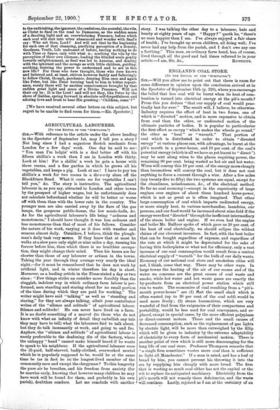AGRICULTURAL LABOURERS.
[TO TILE EDITOR OP THZ "SPECTATOR:]
gra,—With reference to the article under the above heading in the Spectator of September 1st, may I tell you a story ? Not long since I had a sagacious Scotch mechanic from London for a few days' work. One day he said to me: "Yon man I'm lodgin' with is a deal better off with his fifteen shillin's a week than I am in London with thirty. Look at him! For a shillin' a week he gets a house with three rooms, and a fine garden in which he grows all his vegetables, and keeps a pig. Look at me ! I have to pay ten shillin's a week for two rooms in a du' .-r-r-ty slum off the Blackfriars Road. What it costs me for vegetables I can't tell you," &c. The story is instructive. The agricultural labourer is, as you say, attracted to London and other towns by the prospect of higher wages, but he unfortunately does not calculate beforehand whether he will be better or worse off with them than with the lower rate in the country. The younger men are also carried away by the flare of the gas lamps, the gorgeous public-house, the low music-halls, &c. As for the agricultural labourer's life being "arduous and monotonous," I should have thought it was leas arduous and less monotonous than that of most of his fellows. Consider the nature of his work, varying as it does with weather and seasons almost daily. Outsiders, I believe, think the plough- man's daily task very severe. If they knew that at most he walks at a slow pace only eight or nine miles a day, turning his furrow before him, than which there is no healthier occupa- tion, they might change their mind. Then his hours are far shorter than those of any labourer or artisan in the towns. Taking the year through they average very nearly the ideal eight,—for it must be remembered that he does not work by artificial light, and in winter therefore his day is short. Moreover, as a leading article in the Times stated a day or two since: "Few things strike an outsider more forcibly than the sluggish, indolent way in which ordinary farm labour is per- formed, men standing and staring about for no small portion of the time during which they are paid for working." The writer might have said " talking " as well as "standing and staring," for they are always talking, albeit your contributor writes of the "silence and solitude" of agricultural labour. Silence and solitude! He can never have lived on a farm. It is no doubt something of a marvel (to those who do not know with what an infinity of detail they embellish any tale they may have to tell) what the labourers find to talk about, but they do talk incessantly at work, and going to and fro. Anyhow, the "silence and solitude" of agricultural labour is surely preferable to the deafening din of the factory, where the unhappy " hand " cannot make himself heard if he wants to speak to his neighbour. If the agricultural labourer were the ill-paid, half-starved, badly-clothed, overworked mortal which he is popularly supposed to be, would he at the same time be (as in fact he is) the longest-lived member of the community save and except the clergyman P To this longevity the pure air he breathes, and his freedom from anxiety (for he marries early, knowing that however many children he may have work will be found for them, and probably in his own parish), doubtless conduce. Let me conclude with another story. I was talking the other day to a labourer, hale and hearty at eighty years of age. "Happy P" quoth he, "there's no man happier than I am. I've always enjoyed a fair share of health; I've brought up seven children, all doing well; rye never had any help from the parish, and I don't owe any one a farthing." This man, an ordinary farm hand, has, of course, lived through all the good and bad times referred to in your






































 Previous page
Previous page